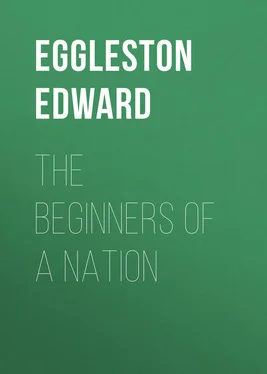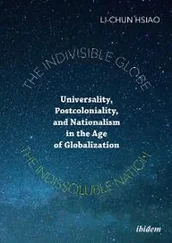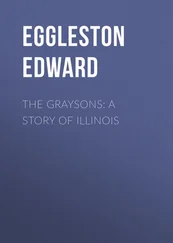Edward Eggleston - The Beginners of a Nation
Здесь есть возможность читать онлайн «Edward Eggleston - The Beginners of a Nation» — ознакомительный отрывок электронной книги совершенно бесплатно, а после прочтения отрывка купить полную версию. В некоторых случаях можно слушать аудио, скачать через торрент в формате fb2 и присутствует краткое содержание. Жанр: История, foreign_antique, foreign_prose, на английском языке. Описание произведения, (предисловие) а так же отзывы посетителей доступны на портале библиотеки ЛибКат.
- Название:The Beginners of a Nation
- Автор:
- Жанр:
- Год:неизвестен
- ISBN:нет данных
- Рейтинг книги:4 / 5. Голосов: 1
-
Избранное:Добавить в избранное
- Отзывы:
-
Ваша оценка:
- 80
- 1
- 2
- 3
- 4
- 5
The Beginners of a Nation: краткое содержание, описание и аннотация
Предлагаем к чтению аннотацию, описание, краткое содержание или предисловие (зависит от того, что написал сам автор книги «The Beginners of a Nation»). Если вы не нашли необходимую информацию о книге — напишите в комментариях, мы постараемся отыскать её.
The Beginners of a Nation — читать онлайн ознакомительный отрывок
Ниже представлен текст книги, разбитый по страницам. Система сохранения места последней прочитанной страницы, позволяет с удобством читать онлайн бесплатно книгу «The Beginners of a Nation», без необходимости каждый раз заново искать на чём Вы остановились. Поставьте закладку, и сможете в любой момент перейти на страницу, на которой закончили чтение.
Интервал:
Закладка:
Edward Eggleston
The Beginners of a Nation A History of the Source and Rise of the Earliest English Settlements in America, with Special Reference to the Life and Character of the People
My dear Mr. Bryce :
In giving an account of the origins of the United States, I have told a story of English achievement. It is fitting that I should inscribe it to you, who of all the Englishmen of this generation have rendered the most eminent service to the American Commonwealth. You have shown with admirable clearness and candor, and with marvelous breadth of thought and sympathy, what are the results in the present time of the English beginnings in America, and to you, therefore, I offer this volume. I need not assure you that it gives me great pleasure to write your name here as godfather to my book, and to subscribe myself, my dear Mr. Bryce,
Yours very sincerely,
Edward Eggleston.PREFACE
In this work, brought to completion after many years of patient research, I have sought to trace from their source the various and often complex movements that resulted in the early English settlements in America, and in the evolution of a great nation with English speech and traditions. It has been my aim to make these pages reflect the character of the age in which the English colonies were begun, and the traits of the colonists, and to bring into relief the social, political, intellectual, and religious forces that promoted emigration. This does not pretend to be the usual account of all the events attending early colonization; it is rather a history in which the succession of cause and effect is the main topic – a history of the dynamics of colony-planting in the first half of the seventeenth century. Who were the beginners of English life in America? What propulsions sent them for refuge to a wilderness? What visions beckoned them to undertake the founding of new states? What manner of men were their leaders? And what is the story of their hopes, their experiments, and their disappointments? These are the questions I have tried to answer.
The founders of the little settlements that had the unexpected fortune to expand into an empire I have not been able to treat otherwise than unreverently. Here are no forefathers or foremothers, but simply English men and women of the seventeenth century, with the faults and fanaticisms as well as the virtues of their age. I have disregarded that convention which makes it obligatory for a writer of American history to explain that intolerance in the first settlers was not just like other intolerance, and that their cruelty and injustice were justifiable under the circumstances. This walking backward to throw a mantle over the nakedness of ancestors may be admirable as an example of diluvian piety, but it is none the less reprehensible in the writing of history.
While the present work is complete in itself, it is also part of a larger enterprise, as the half-title indicates. In January, 1880, I began to make studies for a History of Life in the United States. For the last sixteen or seventeen years by far the greater part of my time has been given to researches on the culture history of the United States in the period of English domination, that "good old colony time" about which we have had more sentiment than information. As year after year was consumed in this toilsome preparation, the magnitude of the task became apparent, and I began to feel the fear for my work so felicitously expressed by Ralegh, "that the darkness of age and death would have covered over both it and me before the performance." It seemed better, therefore, to redeem from the chance of such mishap a portion of my work, by completing this most difficult part of the task, in order that when, early or late, the inevitable night shall fall, the results of my labor, such as they are, may not be wholly covered over by the darkness.
There is always difference of opinion in regard to the comparative fullness with which the several portions of a historical narrative should be treated, and I can not hope to escape criticism on this point. I have related some events with what will be considered disproportionate amplitude of detail. But the distinctive purpose of this work is to give an insight into the life and character of the people, and there are details that make the reader feel the very spirit and manner of the time. It is better to let the age disclose itself in action; it is only by ingenious eavesdropping and peeps through keyholes that we can win this kind of knowledge from the past. Literary considerations should have some weight in deciding how fully an episode shall be treated, unless the historian is content to perform the homely service of a purveyor of the crude ore of knowledge. I have sought to make this "a work of art as well as of historical science," to borrow a phrase from Augustin Thierry. Some omissions in this volume will be explained when its successors appear.
I find it an embarrassing task to make acknowledgment to those who have assisted me; the debts that have accumulated since I began are too many to be recorded. I must not neglect to express my grateful remembrance of the hospitality shown to my researches during my various sojourns in England. At the British Museum and at the Public Record Office every facility has been extended to me, and a similar attention was shown to my wants at other less public repositories of books, such as the Society for the Propagation of the Gospel. To Dr. Richard Garnett, the head of the printed book department of the Museum, I owe thanks for many personal attentions. I am also indebted to Mr. E. M. Thompson, keeper of the manuscripts in the museum. The late Mr. W. Noel Sainsbury, of the Public Record Office, was very obliging. I owe most of all to the unfailing kindness of the Right Honorable James Bryce, M. P., who found time, in the midst of his preoccupations as a member of Parliament and his duties in high office, to secure for me access to private stores of historical material. Lord Edmund Fitzmaurice with generous kindness put himself to much trouble to facilitate my examination of the manuscripts at Landsdowne House. I am indebted to Lord Leconsfield for permission to visit Petworth House and read there Percy's Trewe Relacion in the original manuscript. I must ask others in England who befriended my researches to accept a general acknowledgment, but I can not forget their courtesy to a stranger. In common with other students I received polite attentions during my researches in Paris at the Bibliothèque Nationale.
In this country I owe much to the librarians of public libraries and their assistants – too much to allow me to specify my obligations to individuals. At the Astor, and at the Lenox, under its more recent management, my debt has been continual for many years. Acknowledgments are due to the officers of the Boston Public Library, the Library of Congress, the Peabody Institute in Baltimore, and the libraries of the New York, the Massachusetts, the Pennsylvania, the Maryland, and the Virginia Historical Societies. To Harvard College Library and to the New York State Library I am specially indebted; from them I have been able to supplement my own collection by borrowing. The Brooklyn Mercantile Library has granted me similar privileges. The New York Mercantile Library, on the other hand, I have not found hospitable to research.
To my generous friend Mr. Justin Winsor I owe thanks for many favors. Dr. Thomas Addis Emmet opened his valuable collection to me, and the late Mr. S. L. M. Barlow showed me similar kindness. My friend, Mr. Oscar S. Straus, permitted me to use at my own desk valuable works from his collection. There are others whose friendly attentions can be more fitly recognized in later volumes of this series, and yet others whom I must beg to accept this general but grateful acknowledgment.
Читать дальшеИнтервал:
Закладка:
Похожие книги на «The Beginners of a Nation»
Представляем Вашему вниманию похожие книги на «The Beginners of a Nation» списком для выбора. Мы отобрали схожую по названию и смыслу литературу в надежде предоставить читателям больше вариантов отыскать новые, интересные, ещё непрочитанные произведения.
Обсуждение, отзывы о книге «The Beginners of a Nation» и просто собственные мнения читателей. Оставьте ваши комментарии, напишите, что Вы думаете о произведении, его смысле или главных героях. Укажите что конкретно понравилось, а что нет, и почему Вы так считаете.












